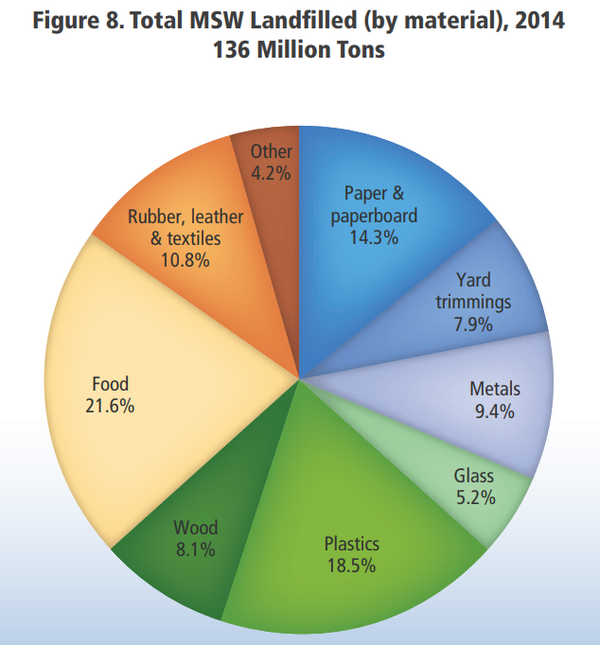Top Five Reasons to Compost
Vermont's Universal Recycling Law focuses a lot on food scrap diversion and composting - but why? Not only can you save money by throwing away less trash, composting is great for the community, soil, and environment.
1. Composting reduces waste, makes us less dependent on landfills, and decreases greenhouse gas emissions.
Every day, the average American generates roughly four and a half pounds of waste – that’s about 1,600 pounds per year per person. With the recycling rate at around 34%, and about 13% of the waste stream being incinerated, the majority of this waste – approximately 53%, or roughly 136 million tons – is sent to landfill every year (source). The largest component of landfilled municipal solid waste (MSW) is food scraps, accounting for approximately 22% of municipal discards in the landfill.
Organic matter in the landfill decomposes anaerobically, meaning without access to oxygen. This process is different from aerobic decomposition, which is how organic matter naturally decomposes. When food breaks down without oxygen, it produces greenhouse gases (primarily methane), which can escape the landfill and accumulate in the atmosphere, contributing to global warming. In fact, MSW landfills are the third-largest emitter of human-related methane gas in the United States.
Composting, on the other hand, mimics nature’s method of decomposition, allowing organic material to break down aerobically. Thus, composting greatly reduces our overall waste being sent to landfills, and also cuts greenhouse gas emissions.
2. Compost strengthens soil and promotes healthy plant growth.
Adding compost to soil improves its structure and texture, making it more ideal for plant growth by adding organic matter. With higher percentages of organic matter, soil is better able to retain water, nutrients, and air – benefiting the entire ecosystem by creating an optimal environment for plants, and by reducing runoff and erosion. According to the EPA, an increase in organic matter of just one percent can triple the soil's water holding capacity. Read more about how compost improves soil structure.
3. Composting reduces the need for pesticides and synthetic fertilizers.
Because compost enriches soil and promotes healthy plant growth, plants grown in compost-rich soil tend to be more resilient to diseases, pests, and fungi. The healthy bacteria and critters that are present in compost also help fight off harmful pests and diseases before they can get to plants – thus reducing the need for toxic pesticides.
In addition, compost is a slow-release nutrient source for plants. The diverse materials in compost break down at different rates, slowly releasing nutrients over a long period of time; as opposed to releasing them all at once, as fertilizers do. Compost also contains a greater variety of nutrients than fertilizers, because it is made with so many different types of materials. Because compost both adds nutrients to soil and alters soil structure so that it retains nutrients more effectively, compost reduces the need for fertilizers.
4. Composting recycles essential nutrients back into the soil.
Food scraps are a valuable resource! Just like the parts that you eat, the parts of food you toss contain important vitamins and minerals that, when returned to soil, get recycled back into the ecosystem and taken up by the next round of crops grown on the land.
Unfortunately, today’s intensive agricultural methods have resulted in nutrient depletion in soils, which in turn has caused the fruits and veggies they grow in to be significantly less nutritious than a few decades ago. An important way to combat this is to promote healthy soil – which can be done by composting.
5. Compost promotes a prolific soil ecosystem.
Compost attracts critters and microorganisms that are good for soil and plants. Think of compost like probiotics for the human body – good bacteria are needed to fight off diseases and keep us alive and functioning. Similarly, in order for soil to be healthy, it needs to foster a community of organisms that break down matter, improve soil structure, and create a fertile environment for plants. Compost comes with a myriad of organisms that do just that.
Read more about the benefits and uses of compost.
Read more about how to compost at home, register for a free composting workshop, our download our backyard composting guide!
Get a compost bin
ACSWMD has compost bins and kitchen collectors available for purchase at the District Transfer Station.

